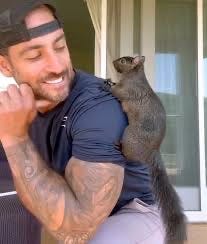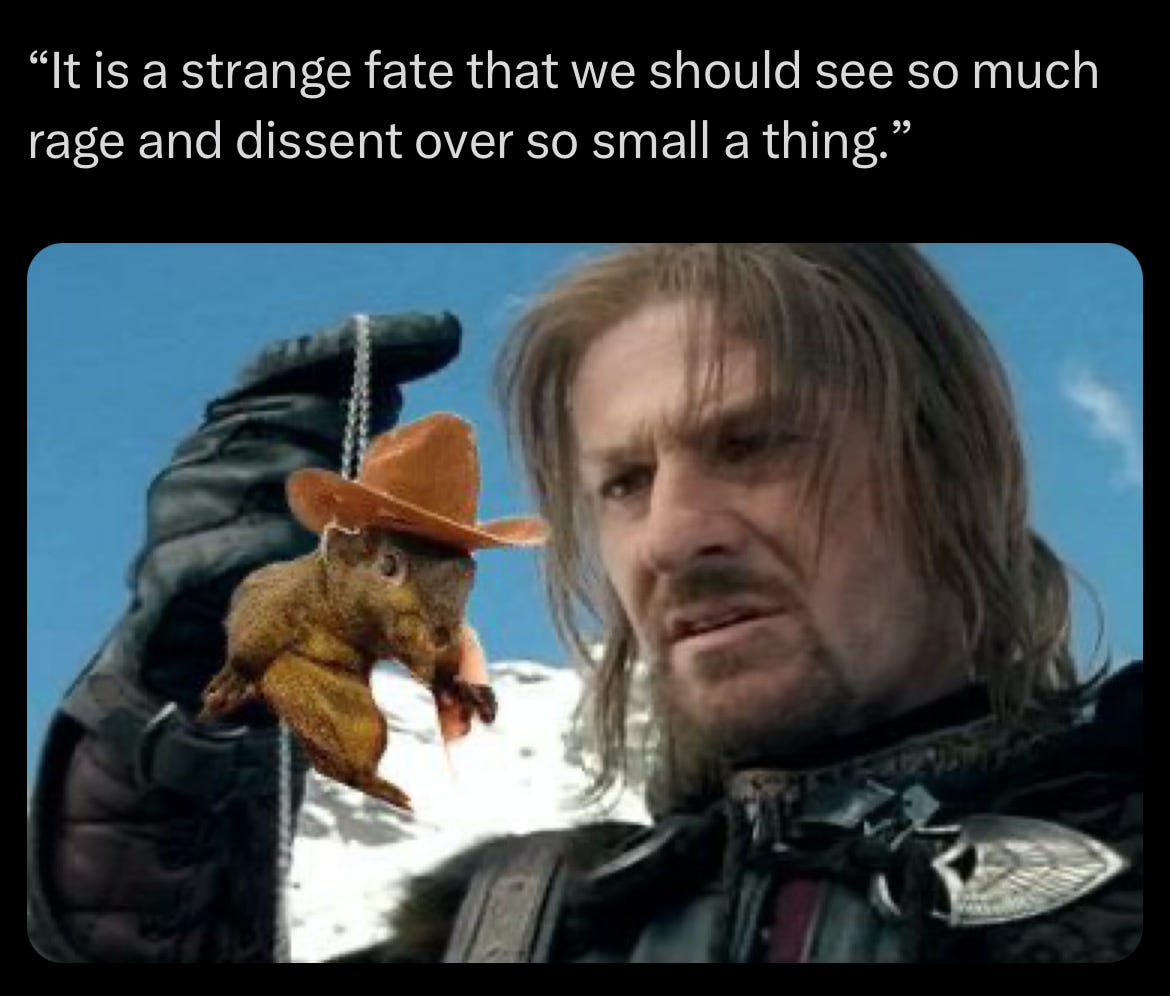If you spent any time on the internet this past weekend (or follow Elon Musk on X), you might have heard about Peanut the squirrel. It’s a sad story about a man who rescued and rehabilitated the orphaned squirrel after his mother was run over by a car. Mark Longo, the owner, who opened an animal rescue sanctuary last year, quickly developed a large following on social media where he posted videos of Peanut living happily in their home. The videos clearly indicate that Peanut had become domesticated, and Longo and his family considered the squirrel a part of their family.
But after an anonymous complaint to New York State’s Department of Environmental Conservation (DEC), officers raided Longo’s home last Thursday and seized Peanut (alongside Fred the raccoon, another rehabilitated animal). The DEC claimed that the animals posed a “rabies” threat to the Longo family and euthanized Peanut and Fred before the Longo family could appeal.
Longo and his family quickly took to social media to tell their story. Within hours, TMZ interviewed the family and Elon Musk was furiously posting the story on X where it exploded.
Peanut became a meme before the mainstream media even had time to report on it. Overnight, a domesticated squirrel became a symbol of resistance, of the growing discontent Americans feel towards not only the federal government but all branches of the state apparatus. Amidst hyper-inflation, another war looming in the Middle East, trillions in debt, and simmering civil unrest, Peanut felt like the straw that broke the camel’s back. Possibly the story begged the question: If the state of New York had the resources and manpower to seize a squirrel, why has it not solved the issues of homelessness, crime, fraud, and mass illegal migration?
Authorities have no answer.
As I watched the Peanut saga unfold on social media, I could not help but think of other famous animal tales and the morals they leave us. A couple years ago, I bought a version of Aesop’s Fables for my daughter. As an avid animal lover, she immediately gravitated toward the famous, ancient stories such as the Boy Who Cried Wolf, the Tortoise and the Hare, the Ant and the Grasshopper, the Lion and the Mouse, and the Town Mouse and the Country Mouse. Each short, compact story uses familiar and beloved animals to teach simple morals or truths. Some of those stories have become so ingrained in our consciousness that many of us know exactly what our mom means when she says, “remember the boy who cried wolf.”
Considering that Aesop lived in Ancient Greece between 620 and 564 BC, it is mesmerizing that these stories continue to fascinate young children and adults alike. It is a testament to the power of story. Yet it also a demonstration of the power of truth; somehow truth transcends culture, time, and geography. If someone lies habitually, his friends and family will cease to believe him. If one is too cocky of his prowess, he may end up making a costly mistake. If we spend all of our time playing, we risk being unprepared when hardship inevitably shows up. If we assume someone is “beneath” us, we may miss out on gaining a helpful friend or ally. And although it is easy to envy those who may live with more luxury and excitement, we should never take safety and peace for granted.
Is it any wonder then that the story of a simple squirrel would inspire such cultural fervor?
The story of Peanut the squirrel grips us because of its core value: innocence. There is something particularly wholesome about a man rescuing a baby squirrel and raising it as his own. It speaks to an inherent knowledge that animals possess no guile or artifice. They are simple creatures who need food, shelter, sleep, and play. Even when they kill and harm other animals, their intentions spring from survival not malice. As wild and dangerous as they can be, they are innocent of the sadistic impulses that so often drive humans. Their motives are pure.
Based on appearances, it seems that Mark Longo’s motives were also pure. Instead of leaving the orphaned squirrel to a risky and vulnerable fate, he rescued the creature and nursed it in his home. In return, Peanut felt safe enough to trust Longo; pretty remarkable considering the frequent animosity between humans and the often pesky rodents. Increasing urbanization has made life a bit more complicated for most animal species, and squirrels often bear the brunt of our slavish reliance on cars. Yet somehow, Longo and Peanut developed a deep and sweet bond.
What will historians have to say about the fable of Peanut the squirrel hundreds if not thousands of years from now? Perhaps they will focus on the relationship between a social media influencer and his adorable but ultimately doomed pet, a tragic but sadly typical experience many of us will endure at some point. Or perhaps they will fixate on the cultural impact and the timing of such a tale. With merely a day before the presidential election, after decades of increasing political and cultural decay and turmoil, the longing for innocence and virtue has never been stronger. As the American Empire wanes, its people cry out for a return to simpler, nobler times. Whether that will happen after the election is up to God, but we cannot ignore the truth we are left with in the wake of the Peanut saga; a truth that will live on far beyond any of us.
Corruption’s foil is not power but innocence.
“If you have men who will exclude any of God’s creatures from the shelter of compassion and pity, you will have men who will deal likewise with their fellow men.” - St. Francis of Assisi







Sir, you are unwell. Your harassment is unhinged and ungodly. If you don’t refrain from attacking me online, I will send out all these screenshots publicly so your congregation can see and judge your behavior.
Your so dumb, you provide the context for my quote on Hippolytus and somehow, in your derangement, think doing so proves my accurate quote incorrect.
You're not wise or insightful. You're just another self-important, liberal fraud, more offended by conservatives who want justice on terrorists than what terrorists do.